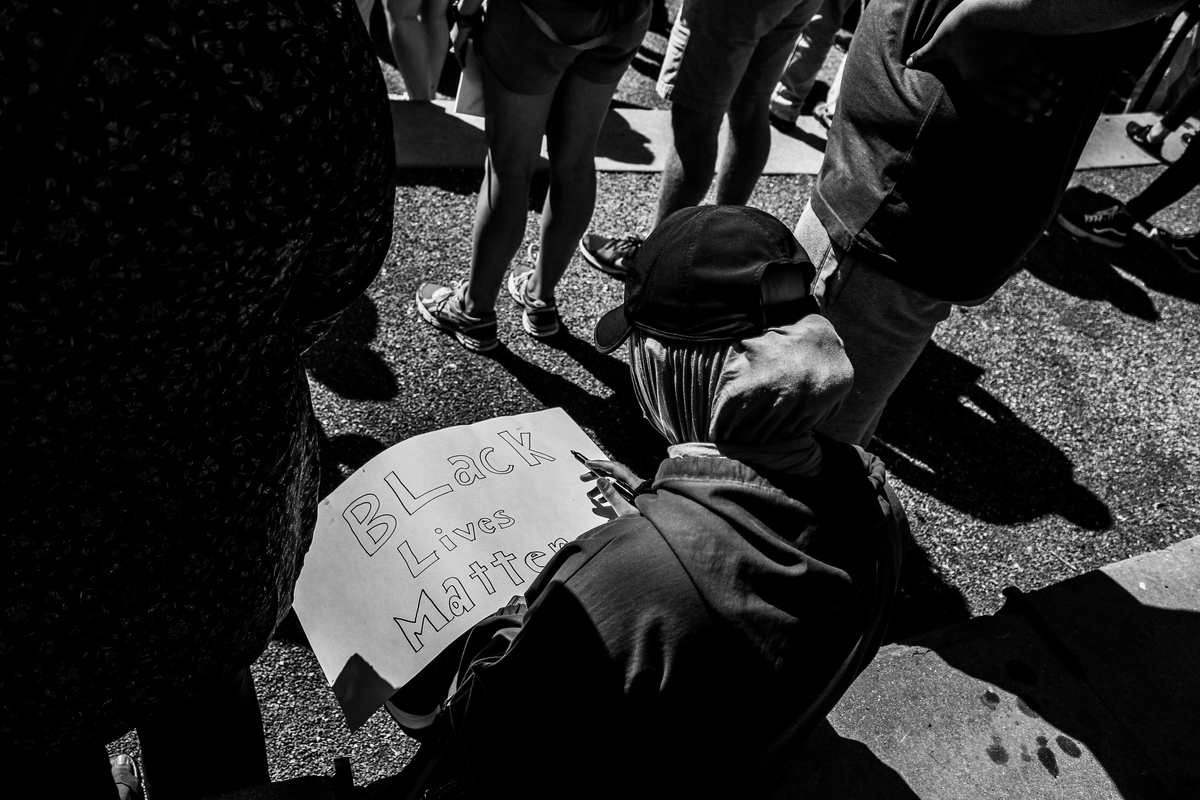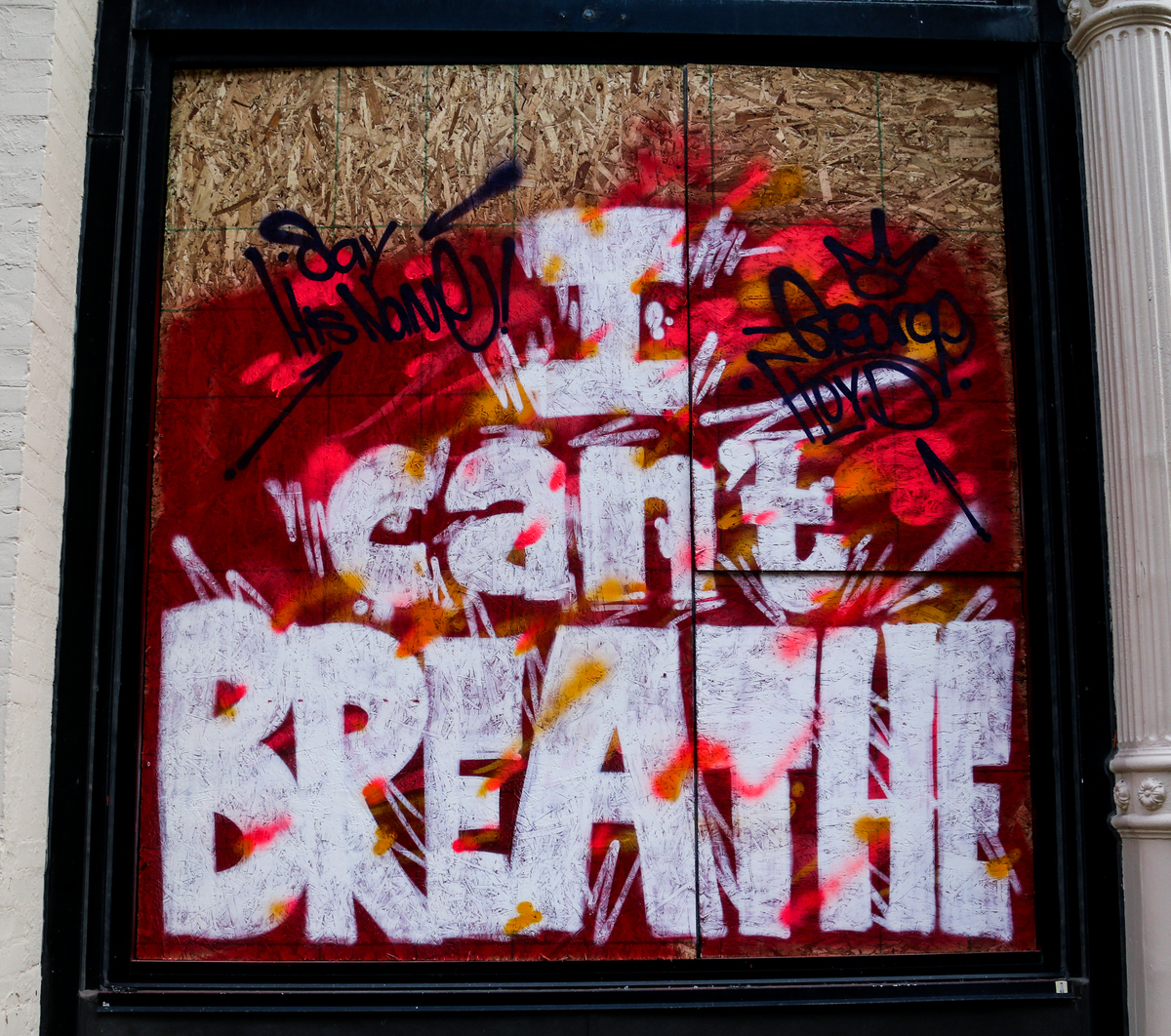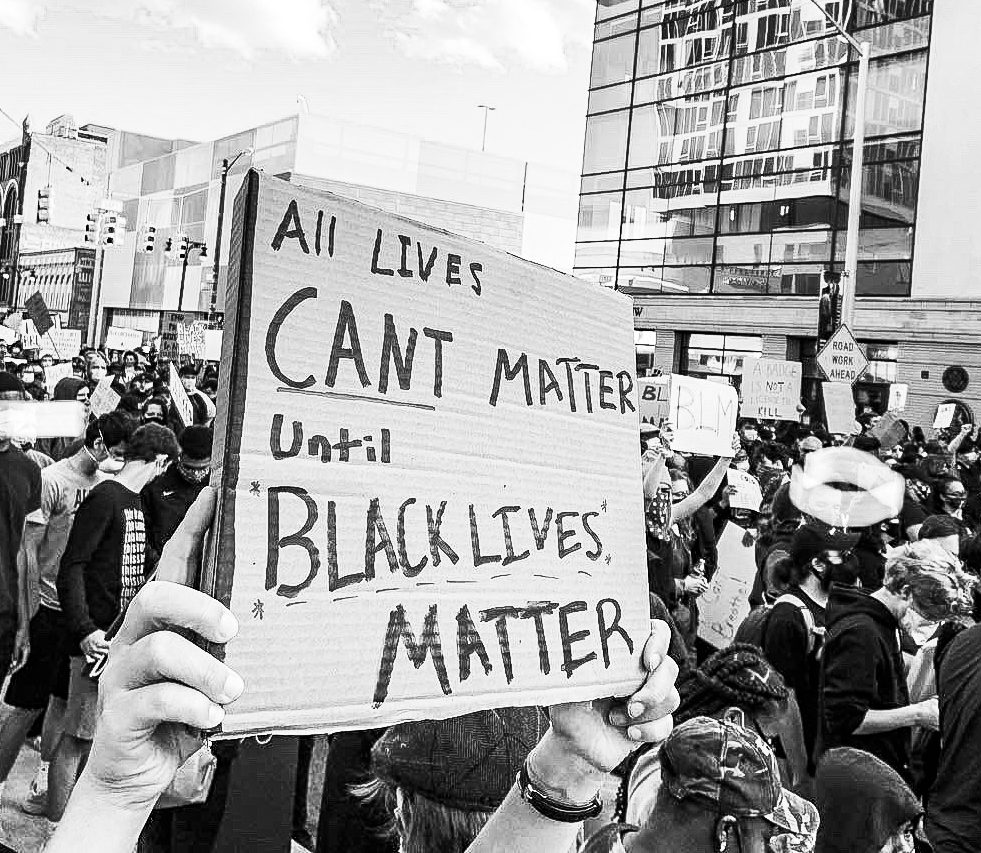Three months after George Floyd, Calvin continues to respond to BLM movement
September 10, 2020
“Black Lives Matter.” The slogan of a movement and refrain of a video created this summer by Calvin faculty and staff in response to the killing of George Floyd. The video, which has currently been viewed over 1,400 times on YouTube, was the most visible of the ways in which the university responded to Black Lives Matter protests this summer.
George Floyd died on May 25, 2020, and his killing sparked a reinvigoration of the Black Lives Matter movement, with protests held across the United States (including in Grand Rapids) and around the world. For the first few days after Floyd’s death, there was no official communication or statement from Calvin’s administration, sparking frustration among some students and staff who wanted to see their university take a public stand against racial injustice.

Residence Life staff members Rachel Hamilton and Michelle Guinyard were among those questioning the silence from Calvin, writing an open letter to the administration and a Chimes op-ed. “We wanted Calvin as an institution to speak up, to show that they stand in solidarity with their students of color who were hurting. And to show they are an institution that condemns racism,” Hamilton and Guinyard wrote in their op-ed, published in Chimes on June 2.
On June 4, Vice President of Student Life Sarah Visser sent out an email including statements from John Witte, dean of students, and Mary Hulst, university pastor. “We want to take a moment to not only recognize national pain, but to name it within our own community, and especially among our students and staff of color here at Calvin,” they wrote.
The idea for a Black Lives Matter video started on a Calvin prayer walk organized by Hulst directly after the protests in Grand Rapids. There, professors Elisha Marr, Kristen Du Mez and Emily Helder discussed their shared desire to communicate support for Black Lives Matter and started brainstorming ideas.
“We felt like this was a time of need and we wanted to reach out to students,” said Marr. The first idea the group came up with was to put a Black Lives Matter banner on Calvin’s Crossing, but regulations regarding the display of banners above Michigan state highways stymied the project. The group decided to put together a video to give students the opportunity to hear from many different faculty and staff voices. Marr, Du Mez and Helder reached out to a Facebook page of Calvin professors to share their idea and recruit participants. Marr explained that the video was very much a grassroots effort, led by the faculty. They deliberately decided to not go through a formalization process with the administration for the sake of sharing it with students as soon as possible.
“I was pleasantly surprised by how many people said ‘yes, I want to be part of this’,” said Marr.
The video begins with a sequence of faculty and staff lamenting police brutality and repenting structural racism. It then moves into a main segment where faculty and staff speak about how racism has infected their fields and how their fields can bring about positive change for racial justice. All of these speakers were white, a deliberate choice by the video makers.
Marr, Du Mez and Helder consulted with Jane Bruin, director of the Center for Intercultural Student Development (CISD) to learn what students wanted from a Calvin Black Lives Matter video. Bruin explained that in her conversations with students, many expressed a desire to see a response to racism specifically from white faculty at Calvin and hear from a variety of people outside those who work specifically in diversity and inclusion. “Our students already know us as allies,” Bruin explained.
“They wanted to see a broad range of people expressing their commitments,” said Helder.
Helder explained that although the administration was not involved in the making of the video, they knew about it and were supportive. University President Michael Le Roy shared the video in a campus-wide email on June 11.
While the “Black Lives Matter, Calvin University” video is the university’s most visible response to the protests against racism and racial injustice, it is only one of many efforts. Student Body President Claire Murashima spoke about what herself and student senate are doing. Murashima was vocal about her support for Black Lives Matter on her @clairethepresident Instagram account, beginning a few days after the killing of Floyd, including sharing the stories of Black students at Calvin. “What I see as my role is representing Black, African-American, and African students and bringing their concerns to the administration,” Murashima said, noting that she appreciated that Calvin eventually came out with a statement.

Last year, student senate set up seven committees called YREPCOMS (Your Representative Committees) to listen to students who are not well-represented, including North American minority students. Murashima explained that the idea is to empower the students on the committees, not the senators. She also stressed that the goal of the YREPCOMS is not to outsource the emotional labor of countering racism to Black students. Student senate is also planning a town hall on racism later this fall.
The fact that much of the work on racial justice at Calvin goes on behind the scenes was something stressed by Murashima, Bruin and Marr.
Marr shared that members of the faculty have created a shared Google document to hold themselves accountable for the promises that they made in the video this summer by asking “What changes have you made?” and to share ideas as they shaped their syllabi for this semester.
Bruin described how the CISD engaged in “person-to-person” care with students in the aftermath of Floyd’s killing. They also organized a learning session for students of color to share their experiences and feedback with faculty. The event was attended by almost 200 faculty members. Some of the students who led the event are now serving on another advisory committee with Le Roy for inclusion. The Multicultural Student Advisory Board which is advised by Bruin, is putting special energy into UnLearn week this year the theme of which is “Be a racial justice warrior. Fight for change. The time is now.”

Marjorie Brunsting • Sep 16, 2020 at 7:33 pm
When you capitalize Black Lives Matter, you are supporting that organization’s views. All you need to do is to read their website which sets out their beliefs and goals. Please, read it for yourself.
As a Christ centered educational institution, Calvin has no business condoning the actions of, or promoting this organization. Work for justice and support for your Black neighbors, but NOT through the BLM organization.
Jane Bruin • Sep 13, 2020 at 11:18 pm
Speaking a simple biblical truth like Black Lives Matter, doesn’t necessitate aligning with any organization. The sentiment is based in the word of God. That being said, the organization and movement that takes up this particular truth isn’t monolithic. Many people express that truth in many ways. I also do not assume that every person who upholds the sanctity of unborn lives condones the bombing of abortion clinics. I don’t know why we need to conflate the truth of people affirm the dignity and worth of black lives with rioting and looting. Well, maybe I do…
Elisha Marr • Sep 11, 2020 at 10:31 pm
Black Lives Matter (BLM) is an organization with chapters and a broader social movement. It is highly informal and decentralized. The actions of some of those involved should not reflect or characterize everyone associated with or supportive of BLM. Recent research on the BLM hashtag on social media published in the Journal of Race, Ethnicity, and Politics, show that the vast majority of tweets in the sample urged actions through the existing political system concluding that, “BLM groups do value the political process and are willing to mobilize their followers to pursue outcomes within it,” p. 319.
Brian Eric Polet • Sep 11, 2020 at 7:32 pm
As an alumnus of Calvin, I am quite disturbed that CU, from top to bottom, is bearing the torch for BLM, an organization that openly fosters rioting, looting
(https://reason.com/2020/08/11/black-lives-matter-chicago-publicly-defends-rioters-and-looters/), racism(https://www.americanthinker.com/articles/2020/06/blm_at_war_with_america.html),
and abortion(https://www.lifesitenews.com/news/did-you-know-black-lives-matter-supports-abortion-homosexuality-anti-family-agenda). This is sickening.